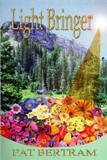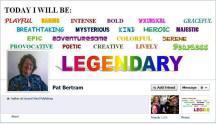Pat Bertram's Blog, page 273
April 24, 2012
Finding Time to Write
 I’ve been trying to get back into writing, but I never seem to able to find the time. There are always so many things that need to be done. Take yesterday, for example. I started out the morning answering emails. I don’t get as many emails as most people, but still, writing responses to the ones that required my attention took me over an hour.
I’ve been trying to get back into writing, but I never seem to able to find the time. There are always so many things that need to be done. Take yesterday, for example. I started out the morning answering emails. I don’t get as many emails as most people, but still, writing responses to the ones that required my attention took me over an hour.
Then I wrote a simple blog post. It was a recap of on online discussion, so it shouldn’t have taken me long, but it did. I’ve heard that people should allocate twenty minutes to updating their blogs, but somehow, my twenty-minute blogs end up taking hours. Writing is how I think, and sometimes it takes a while for the thoughts to coalesce. Sometimes it takes a while to find the right words to express the thoughts. And sometimes it takes a while to edit and copyedit the article to make sure it’s readable and that my point is clear. All those “a while”s added up to three hours yesterday.
When I finally posted the blog, I took time out for a walk and a meal, then I returned to the computer and had an email conversation with a friend who had also suffered the loss of her mate. Since she seems to have reached a place of peace, I wanted to know how she did it. I know I can go on alone since I am doing it, but the thing that still makes me feel as if I’m about to fall off the earth is that he is dead. No matter how well I do, no matter how much peace I attain, he will always be dead. Of course she had no answers for me — one person’s way of learning to live without is not the same as another’s — but she did say something that struck a chord: “the world comes back.” This was an important conversation for me, and I’m glad I had the time to spend, but still, writing my side of the exchange took a couple of hours.
I love comments on my blog, and always enjoy communicating with those who do comment, but that takes time. Yesterday evening, it took me almost an hour to write my responses.
And finally, Facebook. Need I say more? Well, maybe I do. I had several messages that required replies, discussions that needed input, updates that cried out for comments. In all, that added a couple more hours of writing to my writing time.
That’s when I realized why I have no time to write — I spend all my time writing! So, to find time to write, all I need to do is stop writing.
Tagged: answering emails, blog comments, Facebook, finding time to write, writing blogs

April 23, 2012
Why is Writing Important?
With such a staggering number of books on the market and more to come, why is writing important? Only a small percentage of writers have ever made a living at writing (and most of those were people who wrote books on how to make a living at writing), and that percentage seems to be shrinking. More than 80% of books sell fewer than 100 copies. Maybe 50% sell only about ten copies or so. So, why write? The wonder of writing fiction is that a story born in one mind grows to full power in another mind. But what if you don’t have readers, or at least not many? And why take the time to learn the craft since some of the books that do sell are poorly written tripe?
If nothing else, this conundrum that writers face today makes us focus on what we get out of the writing process itself.
For me, writing is something that connects the parts of my life, even though I don’t always write. I once quit a job to write a novel, but found I had no intrinsic talent. I was young and didn’t have the wisdom to know that there are two types of talent — the intrinsic kind that’s called talent, and the learned kind that is in itself a kind of talent, the kind that that comes from trial and error. Even if I had known about the second kind, I didn’t have the patience to write the million words it supposedly takes to learn how to write, so when life got in the way, I let it. Other things simply were more important. (Some people believe you have to have a passion for writing, that it has to take precedence over everything else, but writing is not always “life” nor is life always “writing.” If one does not live, one has no reason to write.) Years later when my life had pretty much come to a standstill because of various misfortunes, I took up writing again, but when my life mate died, I lost the desire to write fiction. Perhaps one day the desire will come back along with a different focus and possibly a different talent.
 Writing for me is also an emotional outlet and a way of discovering why I feel the way I do. While struggling to deal with the death of my long-time mate, I poured out my heart and my soul and my grief into journal entries, letters to my deceased mate, and blog posts. I don’t know if I could have survived without that outlet. A book compiled of some of the best writings of that time, Grief: The Great Yearning, has now been published, yet when I wrote during this time (except for the blogs, of course), I had no expectation of my words ever being read. I wrote for me.
Writing for me is also an emotional outlet and a way of discovering why I feel the way I do. While struggling to deal with the death of my long-time mate, I poured out my heart and my soul and my grief into journal entries, letters to my deceased mate, and blog posts. I don’t know if I could have survived without that outlet. A book compiled of some of the best writings of that time, Grief: The Great Yearning, has now been published, yet when I wrote during this time (except for the blogs, of course), I had no expectation of my words ever being read. I wrote for me.
Reasons for writing are as varied as those who write. For example, in a recent online discussion, horror writer Rob M. Miller said, “I write because I have something to say, and I want it to be heard.” Even if there was a chance he wouldn’t be heard, he would still write because, as he says, “I write to self-explore my mind, to self-medicate, to share my worldview.”
I like those reasons for writing. Too often when I ask writers why they write, they say they only want to entertain, which makes me cringe. If entertaining others is the only reason for writing, then why bother? The “others” can find a lot more entertaining things to do than to slog through someone’s unseasoned prose. But if you’re writing to share your worldview or to explore your mind, then your writing actually has value. Of course we want people to enjoy what we write, but entertainment can’t be the only reason to write, unless it’s for our own entertainment. Writing is a good way of passing the time. It’s better than watching television and it could change someone’s life, perhaps our own.
Tagged: focus on writing, reasons to write, writing as an emotional outlet, writing to entertain, writing to explore one's mind

April 22, 2012
Writing Worth Reading
 In a world where anyone can write a book and get it published regardless of its merit or readability, authors have come to believe they can write however they wish. And of course, they can. Who is going to stop them? There are no longer any gatekeepers to the world of publishing. But still, writing is about communicating. If a writer cannot communicate what he or she wants to say so that another person can follow the story or article without sorting through typos, unruly punctuation, or poor sentence structure, then the writer has failed.
In a world where anyone can write a book and get it published regardless of its merit or readability, authors have come to believe they can write however they wish. And of course, they can. Who is going to stop them? There are no longer any gatekeepers to the world of publishing. But still, writing is about communicating. If a writer cannot communicate what he or she wants to say so that another person can follow the story or article without sorting through typos, unruly punctuation, or poor sentence structure, then the writer has failed.
Whether we are bloggers, content producers for various websites, novelists, these are all tenets we must heed:
1. Use dynamic verbs and concrete nouns, and keep adjectives and adverbs to a minimum. Watch for word qualifiers such as “a little,” “quite,” “somewhat.” They undermine our authority and make our writing seem indecisive.
2. Action first; reaction second. Cause first, effect second. “He finished smoking his cigar, then he aired out the room.” Not: “He aired out the room after he finished smoking his cigar.” When we don’t use the proper sequence, our writing seems unfocused.
3. Use active voice; too much use of passive makes our writing seem muffled.
4. Don’t be clever just for the sake of cleverness, don’t complicate the obvious, and don’t be unconventional for the sake of being exotic; ultimately, our readers will feel used or confused, and we will lose them.
5. Punctuation, spelling, and grammar do count. Content is important, but what good is all our wisdom if we come across as dolts?
6. Strive for clarity, economy, grace, and dignity. We can string words together, but without at least a couple of these particular elements, our writing will not be worth reading.
Tagged: action/reaction, how to be a good writer, punctuation counts, rules for good writing, use dynamic verbs

April 21, 2012
Untaming Me and Embracing My Inner Savage
 I watched The Sleeping Dictionary the other night, or at least as much of it as I have on tape. My life mate/soul mate recorded movies that he liked and often ended them before things got ugly, turning a painful movie into a touching one, so in my version, the story ends when John and Selima profess their love. (I had become so tuned to death and disappointment during his last years that I could not bear stories with unhappy endings or characters who fought instead of appreciating what they had. Watching his movies, I now understand he’d developed that same sensitivity. His version of Braveheart, for example, ends before William Wallace is tortured and killed.)
I watched The Sleeping Dictionary the other night, or at least as much of it as I have on tape. My life mate/soul mate recorded movies that he liked and often ended them before things got ugly, turning a painful movie into a touching one, so in my version, the story ends when John and Selima profess their love. (I had become so tuned to death and disappointment during his last years that I could not bear stories with unhappy endings or characters who fought instead of appreciating what they had. Watching his movies, I now understand he’d developed that same sensitivity. His version of Braveheart, for example, ends before William Wallace is tortured and killed.)
But I digress.
When the young headhunter first appeared on the scene in The Sleeping Dictionary, I was struck by his savagery. I don’t mean his cruelty — though today “savage” is synonymous with brutality, it originally came from a word that means “woods.” I’m referring to his elemental nature, his primal being, his untameness.
I am a highly civilized person. For the most part, I am considerate of others. I am never intentionally rude or bad mannered or insulting. I am not uncouth. I don’t make scenes in public (or private, for that matter). I seldom raise my voice. I listen more than I talk. I dress modestly. I use correct English and am not given to crudeties or foul language. If it’s in my power and nature, I almost always do what others ask. I try to be helpful. In other words, I am tame.
As I watched the movie, I wondered if the time had come to untame me, to embrace my inner primitive. I don’t know what or how to do that, but it’s something worth thinking about. I know your first thought — tattoos. Nope. Today tattoos are not a matter of primalness but of fad, and fad is the epitome of civilization.
It would be interesting to have totems, rituals, amulets that meant something to me and my life, that would help me connect to life or at least remind me of that connection. To find or develop such primal symbols, however, I would first need to know who I am, to know what meaning life has for me, but the death of my life mate/soul mate so devastated me that I no longer know who I am or how I connect to anything.
Now, as I write this, I realize that I don’t need to start a search for my inner primitive. I am already on that quest.
I walk in the desert (as primeval a place as there is around here) and pay attention to how my body and mind join to the earth. I feel how my feet connect with the ground (well, how my shoes connect. I am not so savage as to be willing to walk in rattlesnake country unshod). I feel the air coursing through my lungs, and the breezes touching my skin. I feel the heat of the sun and the coolness of my evaporating perspiration. I open my mind and feel new ideas flowing in and old ideas flowing out.
Maybe someday I will untame me — find out who I am at rock bottom and live according to my truth. And maybe I am living that way now.
Tagged: becoming untame, civilized person, connecting to life, connecting to the earth, desert, inner savage, The Sleeping Dictionary

April 20, 2012
I am Being Interviewed on Blog Talk Radio this Evening
The title says it all. There’s not much more to add. I am being interviewed on Blog Talk Radio this evening. Well, it will be evening if you are on the east coast since the show goes live at 7:00 pm ET, but if you are on the west coast, it will be 4:00 in the afternoon.
Possible topics are:
What kind of books do you write?
Why did you write a book about grief?
Why is your book “Grief: The Great Yearning” important?
Does your past play much of a role in your writing?
How do you help other writers?
Where can people find out more about your books?
(Thank you to everyone who helped me compile this list.)
You can find the show here: Page Turners with Hosts Meg Collins and Nancy Duci Denofio. I will be on for an hour, so if you get a chance, feel free to call in. The number to call is: 1-646-595-4478. If you can’t listen to the show live, it will be archived so you can hear it any time.
Tagged: blog talk radio, interview

April 19, 2012
Surveillance: Poisoning the Soul of a Nation
 The National Security Agency was created on November 4, 1952 under Harry S. Truman. For twenty-five years, only the people involved knew of the existence of this secret agency. In fact, the NSA was so secret even the name was classified — most of the people working for the agency didn’t even know the name of the organization that employed them. Now, of course, the NSA is a staple for conspiracy buffs and thriller writers, though the truth is even spookier than fiction.
The National Security Agency was created on November 4, 1952 under Harry S. Truman. For twenty-five years, only the people involved knew of the existence of this secret agency. In fact, the NSA was so secret even the name was classified — most of the people working for the agency didn’t even know the name of the organization that employed them. Now, of course, the NSA is a staple for conspiracy buffs and thriller writers, though the truth is even spookier than fiction.
In 1980, way before computer usage was common, way before surveillance devices had become as sophisticated as they presently are, the NSA monitored 400,000 calls a day. 146,000,000 calls a year. And that was thirty-two years ago. Today, there are no limits to what the NSA knows or can track
Although their activities might still be secret, the NSA is now far from being a secret organization. They almost seem to delight in showing us their strength as witnessed by the two billion dollar facility they are building in Bluffdale, Utah. This Utah Data Center will be fully operational before the end of 2013, and then the last vestige of our privacy will be gone.
John W. Whitehead of The Rutherford Institute says: “At five times the size of the U.S. Capitol, the UDC will be a clearing house and a depository for every imaginable kind of information — whether innocent or not, private or public — including communications, transactions and the like. Anything and everything you’ve ever said or done, from the trivial to the damning — phone calls, Facebook posts, emails, bookstore and grocery store purchases, bank statements, commuter toll records, etc. — will be tracked, collected, catalogued and analyzed by the UDC’s supercomputers and teams of government agents. In this way, by sifting through the detritus of your once private life, the government will come to its own conclusion about who you are, where you fit in, and how best to deal with you should the need arise.”
It’s possible that the mass of information itself will protect us. One piece of information is worthless. When there are trillions and trillions of bits and bytes out there, why single out one from another? A collection of information, however, could be damning, depending on what light the NSA chooses to view it under. What if they put the pieces together and came up with a version of you that simply isn’t true?
(Incidentally, that originally was the premise of Light Bringer, but the book metamorphosed away from the NSA and their supposed interest in poor Philip’s life, and focused instead on an international organization’s global agenda.)
Have you ever wondered why your attention is kept focused on such unimportant matters as what outrageous thing today’s celebrity-of-choice is doing, what wonderful new gadget is on the market, what the fashion gurus are presenting, what foolish thing the president said or did? It’s sleight of hand to keep you focused on the trivial while the world as you think you know it slips away from you.
Even worse, as Whitehead says, “Whether or not the surveillance is undertaken for innocent reasons, does not surveillance of all citizens gradually poison the soul of a nation?”
And you thought Facebook was bad.
Tagged: government surveillance, John W. Whitehead, loss of privacy, National Security Agency, NSA, The Rutherford Institute, Utah Data Center

April 18, 2012
Do you think writing your book changed your life?
 I wish I could say writing my latest novel Light Bringer changed my life, it would make a good story, but the fact is, it made little difference outside of bringing to a close a lifetime of research. It was the fourth novel I wrote. I’d already experienced the joy and sense of accomplishment completing a novel gives one, and I’d already experienced the disappointment that comes from having a novel rejected. I’d already experienced the joy of getting published and the disappointment of lackluster sales. Now, if Light Bringer would go viral, that would change my life!
I wish I could say writing my latest novel Light Bringer changed my life, it would make a good story, but the fact is, it made little difference outside of bringing to a close a lifetime of research. It was the fourth novel I wrote. I’d already experienced the joy and sense of accomplishment completing a novel gives one, and I’d already experienced the disappointment that comes from having a novel rejected. I’d already experienced the joy of getting published and the disappointment of lackluster sales. Now, if Light Bringer would go viral, that would change my life!
Writing Grief: The Great Yearning, my non-fiction book about surviving grief, didn’t change my life, either. In fact, my life had changed first. Writing was how I coped with the changes.
Here are some responses from fellow Second Wind Publishing authors about how writing their book changed their lives. The comments are taken from interviews posted at Pat Bertram Introduces . . .
From an interview with: J J Dare, Author of False Positive and False World
Writing my first book a few years ago gave me confidence. I believe it was an exercise to prepare me for the challenges I would shortly face in my personal life.
From an interview with: Noah Baird, Author of Donations to Clarity
I think people thought I was pretty weird before the book. They still think I’m weird, but I think I get a pass now because I’m a writer.
From an interview with: Calvin Davis, Author of The Phantom Lady of Paris
After penning the Phantom Lady, I was not the same person. The actual writing of the novel took about five and a half years. During that period, I wrote and rewrote again and again, etc. That said, the truth is, it took me all my life to write the Phantom Lady. The penning of my two other novels was preparing me to write TPLOP. The production of my countless short stories was also tutoring me on how to create the Phantom Lady. And during all this time of schooling, “the lady” was inside me clamoring to be liberated, as I was clamoring to liberate her. “Free me…free me,” she screamed. When I completed the last sentence of the novel, the lady was finally liberated. “Thank you, Calvin,” she said. “Thank you.” Finally, she was free…and so was I.
From an interview with: Sherrie Hansen, Author of Merry Go Round
I think each book that I’ve written has changed my life. I remember an episode of Star Trek, Next Generation, when Jean Luc Picard was swept away to live out his life on another planet. He eventually fell in love, married, had children, and learned to play a musical instrument. When his new world came to an end, he learned that he had never left the Enterprise, and that the whole alternate life experience had occurred only in his mind, in a few days time. I feel like that every time I finish a book. It’s like I’ve visited some alternate reality and lived the life of my character from start to finish, feeling what they feel and experiencing what they experience, when in reality, I’ve just been sitting at my desk, typing away. In a very real way, I think each book makes me a richer, more multi-faceted, more understanding person because I’ve walked a mile (or a hundred) in my character’s shoes.
From an interview with: Coco Ihle, author of She Had to Know
Absolutely. In a couple of ways. My sister and I talked in detail about our lives before we met, and how we felt about all the things that happened and didn’t happen through the years. Our talks created a stronger bond between us.
Another way my life changed was, my adopted mother used to accuse me of starting projects and losing interest before finishing them. Well, I took that criticism to heart. I know she’s up there smiling down at me, because I finish projects now.
So, do you think writing your book changed your life?
Tagged: did writing change your life?, Jean Luc Picard, living the life of a character, mini interviews, writiing as alternate reality

April 17, 2012
How Many Books Are Going to be Published in 2012? (Prepare for a Shock)
 I hadn’t planned to write any more about the book world. For one, it’s too depressing, and for another, I’m getting to where I’m okay with it. I’ve never had much use for 99.99% of books published anyway, so it doesn’t really matter if the world is being overrun with terrible books. It always has been. And, truth be told, I don’t enjoy reading much any more. After having read more than 20,000 books, I’m way past the first flush of enthusiasm when it comes to new books. (Okay, I admit it, I’m jaded.) When people start writing before they have read thousands of books, they don’t know that the story they are telling has been written a zillion times before. Nor do their equally unread readers know or care. It’s new and fresh to them. So, perhaps I should leave the book world to those who still embrace it.
I hadn’t planned to write any more about the book world. For one, it’s too depressing, and for another, I’m getting to where I’m okay with it. I’ve never had much use for 99.99% of books published anyway, so it doesn’t really matter if the world is being overrun with terrible books. It always has been. And, truth be told, I don’t enjoy reading much any more. After having read more than 20,000 books, I’m way past the first flush of enthusiasm when it comes to new books. (Okay, I admit it, I’m jaded.) When people start writing before they have read thousands of books, they don’t know that the story they are telling has been written a zillion times before. Nor do their equally unread readers know or care. It’s new and fresh to them. So, perhaps I should leave the book world to those who still embrace it.
So why am I writing about the book world again? I came across a statistic tonight that totally staggered me.
300,000 books were published in 2003.
407,000 books were published in 2007.
1,052,803 books were published in 2009.
Approximately 3,000,000 books were published in 2011.
And . . . drum roll, please . . . Bowker estimates that they will issue 15,000,000 ISBN numbers in 2012.
That means, 15,000,000 books will probably be published in 2012. 15,000,000. Yikes.
Google estimates that as of August 2010, there were 129,864,880 books in existence. Which means that the total number of books that will be published in 2012 is more than 1/10 of all the books in existence. That is an unfathomable jump, a 500% increase in a single year. (That is correct, right? 3,000,000 times 500% = 15,000,000.) Unbelievable.
I got an email from a book marketer today, wanting me to write an article about what the publishing landscape will look like in 2016. I cannot imagine what it will look like. Even if the number of books published returns to the more typical 200% increase per year, by the year 2016, we will have doubled all the books that were in existence in 2011.
Who is going to read all those books? Who is going to buy them?
Tagged: books published in 2009, books published in 2010, number of books in existence, number of ISBNs issued in 2012








April 16, 2012
What To Do (And What Not to Do) When Someone is Grieving
 Every few weeks I decide to stop posting articles about grief and my grieving process. When one talks, the words dissipate into the atmosphere and are soon forgotten. When one writes, the words last until the paper is lost or destroyed. But when one posts to a blog on the internet, the words are eternal. And I’m not sure showing such vulnerability forever is healthy. As I gather strength and courage to face the challenges of my new life as a woman alone, as I change and grow into the person I will need to become, the vulnerable me of these grieving years will still exist in cyberspace. I don’t know how much this ever-living past will shadow my future; at the very least, it will be a perpetual reminder of a very dark time.
Every few weeks I decide to stop posting articles about grief and my grieving process. When one talks, the words dissipate into the atmosphere and are soon forgotten. When one writes, the words last until the paper is lost or destroyed. But when one posts to a blog on the internet, the words are eternal. And I’m not sure showing such vulnerability forever is healthy. As I gather strength and courage to face the challenges of my new life as a woman alone, as I change and grow into the person I will need to become, the vulnerable me of these grieving years will still exist in cyberspace. I don’t know how much this ever-living past will shadow my future; at the very least, it will be a perpetual reminder of a very dark time.
But life doesn’t seem to want me to give up these posts quite yet. Today’s decision to stop posting was forestalled by an email from a grieving friend who thanked me for voicing what she could no longer say. Any mention of her grief worried her family, and they suggested therapy so often, she now hides her grief from them. And if she writes about grief, relatives call up with advice about moving on or looking for someone new.
People often worry about what to say to someone who is grieving, but they should be more worried about what not to say. Saying almost any heartfelt words will do. We bereft see beyond the sometimes bumbling, often touching attempts to breach the grief gap, and we appreciate the effort.
What we don’t appreciate and have no use for is advice. Generally, the people who offer advice have not a clue what we are going through, so it seems to them a simple matter of just moving on, and they are quite free with suggestions of how to accomplish this. (I cannot think of a single instance where someone who suffered a grievous loss offered me advice, probably because they know how unwelcome and unproductive it would be.)
When I started writing about grief, the whole point was just to say how I felt so others would know that what they are feeling isn’t abnormal even though it feels dreadfully abnormal. I never asked for advice. I never wanted advice. I simply laid out my feelings. And yet I got advice. I tried to be kind and understanding, realizing that the advice-givers felt helpless and wanted to do something to ease my pain, but the truth is, advice does more damage than good. As with my grieving friend, so often the only way we bereft have of staving off advice is to hide our grief, and that is not healthy for anyone.
So, what can you do to help when someone you knows loses a spouse or a child to death?
1. Do something tangible. Offer to clean the house, take care of the kids, take the bereft to lunch, go grocery shopping. Almost as useless as advice is the typical, “Call me if you need help.” How is a person who is totally devastated by grief supposed to find the energy to call? You call. Don’t leave it up to them. And don’t leave it open ended with a “Let me know what I can do.” Be specific. “I’m going to the grocery store. Do you need anything? Milk? Coffee?” or “You’ve had a lot of people tramping through your house. Can I help clean up?” The best thing anyone did for me was clean the house before I moved. I will never forget that, will appreciate it as long as I live.
2. Let the person talk. Don’t try to make it better. Don’t offer advice. Simply listen. A woman I knew casually invited me to lunch, and she asked questions about him, let me talk, listened. It made me feel less alone, less of a pariah.
3. After the first month, the thing that helped me most was sharing stories with other bereft. (In the beginning, the whole thing was so overwhelming, I couldn’t deal with anyone else’s pain; I couldn’t even deal with my own.) As depressing as it was to find out that people still had occasional grief upsurges after ten years or that they never stopped missing their loved one, it helped knowing that others had gone through the same thing I was experiencing, and it helped knowing what I was up against. But if you haven’t suffered a similar loss, please do not talk about the death of your 100-year-old grandmother, or your dog, or your cousin. Even though these losses are important to you, they don’t offer any comfort to someone who has just lost the love of her life, especially if he died at a relatively young age.
4. Always, a shoulder to cry on and a comforting hug are welcome, and are worth a million times more than advice. Even better, cry with us. A few days after my life mate/soul mate died, I stopped by the grocery store where he and I shopped. The clerk asked where he was, and when I told her, she hugged me and cried with me. Not enough tears had been shed for him — no amount of tears will ever be enough—so those tears gave me comfort. His life — and death — shouldn’t pass lightly. No one’s should.
Tagged: giving advice to grievers, helping grievers, the grieving process, what to do when someone dies, writing about grief








April 15, 2012
Facing My Dreads
 Yesterday was Saturday, typically a sadder day for me, but today I felt strong enough to face some of my fears. Or at least my dreads. Facebook has been threatening to switch me over to their new timeline format and today I decided to run toward my dread so I could get it out of my head. I wasn’t sure what photo I wanted to feature. I’d planned to use photos of my books, but since I used them for my page, I didn’t want to confuse the issue by using the same image for my profile. I’d played around with word art once, so I decided to use that. Spent a couple of hours getting it just right. So now I have timeline. And I have overcome one dread.
Yesterday was Saturday, typically a sadder day for me, but today I felt strong enough to face some of my fears. Or at least my dreads. Facebook has been threatening to switch me over to their new timeline format and today I decided to run toward my dread so I could get it out of my head. I wasn’t sure what photo I wanted to feature. I’d planned to use photos of my books, but since I used them for my page, I didn’t want to confuse the issue by using the same image for my profile. I’d played around with word art once, so I decided to use that. Spent a couple of hours getting it just right. So now I have timeline. And I have overcome one dread.
Then I decided to go after the big one. Watching a movie.
My life mate and I used to watch movies together — all kinds, from westerns to serial killer movies to comedy to romance. He taped hundreds of movies for us, and they’ve been packed away since his death two years ago. I just could not bring myself to watch the movies, especially the romantic ones because I knew how much it would hurt.
Flush with the success of overcoming the dreaded timeline, however, I decided to watch Notting Hill. I’d pulled it out of storage to view on the one-year anniversary of his death, planning to celebrate his life, but I couldn’t do it. I couldn’t even put it away. The tape has been sitting on the shelf, waiting for me to watch for a year and two weeks. And it is again sitting on the shelf.
I put the tape in the VCR, watched for about forty-five minutes, and then came the gusher. Not just tears but sobs and gasps for breath and a yearning to see him one more time that clawed at me with a ferocity I haven’t felt in months.
I know two years isn’t that long, but I never imagined I would still have such upsurges of grief. Mostly I can handle being alone, though I do have times of gargantuan loneliness. I even have times now, such as when I’m focused on completing a task, where my missing him gets pushed into the background. And sometimes I can even look forward to the future. But the one thing I can never seem to get a grip on is the thought of his being dead. I have come full circle to a realization of how necessary it was for him to die. He was in such pain and could no longer function that continued life would have been torture. But even so, I hate knowing that he will never eat another meal. Never read another book. Never plant another tree. Never watch another movie.
I do still have the ability to watch movies, and someday I will finish watching this one.
Just not today.
Tagged: Facebook, Facebook timeline, facing fears, grief upsurge, Notting Hill, watching movies











